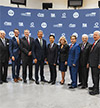How is AI is being used by HR, workforce development, and headhunting pros to find candidates in such a competitive job market?
“Although we are just scratching the surface, there are a few AI trends emerging in the staffing industry,” said Ridge Carpenter, AI product manager for staffing firm Kelly Services in Seattle, Washington. “AI is being used to automate the sourcing and matching of candidates, the outreach and communication with talent, and the creation of job descriptions and interview questions. AI allows recruiters to scale their efforts and magnify their reach. It saves time and streamlines tedious tasks, allowing HR professionals to dedicate more time and resources to building relationships with talent, solving more complex challenges, and strategic planning.”}
Things AI Can Do
Here are six ways AI can help recruiters do their jobs, in less time and with better results:
- Manage the talent pipeline.
AI can do repetitive manual tasks such as screening and sorting candidates and can even customize questions for applicants to make interview time as efficient as possible. One the greatest benefit of AI is that it can assess the entire pipeline of candidates so that no one is overlooked. “It is shocking that companies today unabashedly admit how only a small portion of the millions of applicants who apply are ever reviewed,” stated Harvard Business Review. - Thousands of channels.
AI programs allow recruiters to post their job openings across thousands of free and premium distribution channels, including specialized digital job platforms such as Indeed, LinkedIn, JobStreet, and Monster. “Also, all sponsored job advertising campaigns can be managed from a single platform,” noted Manatal, a provider of recruitment software. - Profile enrichment.
AI-powered algorithms can analyze job descriptions, resumes, and candidate profiles to find the best match for any position. Recruiters often go beyond these basic sources of data to include analysis of social media and public platforms to deepen candidate profiles.
Kelly Services has recently created its own generative AI assistant called GRACE “which saves our recruiters time by quickly creating candidate summaries and job postings,” said Carpenter. “We're always looking for new innovations to add to our toolbox. Currently we are piloting two generative AI platforms to see how they can improve our workplace and empower teams to innovate.” - Select the best candidate.
AI engines can simplify the hiring process and select the best candidate for the job quickly, based on the qualities the AI system was trained to evaluate and prioritize. Candidate profiles can be enriched with information from social media sites, leading to more accurate match recommendations. Certain AI tools can even analyze the pipeline to identify highly qualified candidates who have yet to apply for the job. - Candidate onboarding.
For each new hire or placement, recruiters can use AI to monitor every step of the employment experience, from offer letter to onboarding and beyond. “Recruiting software can also be customized to keep track of onboarding events such as starting dates, probation periods, or end of employment,” said Manatal. “It can also customize onboarding milestones for a given job.” - Strengthen diversity.
AI is very effective at eliminating human bias by leaving out certain attributes such as age, gender, and education. Seekout, a provider of recruitment software, recommends building a data-driven diversity hiring strategy “that improves representation in talent pipelines and addresses unconscious bias in the recruiting process,” said Seekout. “Use data-driven insights to refine your talent process for under-represented candidates.”
According to a LinkedIn Talent Blog entitled “How AI Will Change Hiring, “writers Lydia Abbot and Laura Hilgers report that, in a February 2023 survey, roughly two-thirds of recruitment pros surveyed said they were very hopeful about the impact of AI on recruiting and how it will save them time:
“AI has revolutionized the recruitment landscape by automating tasks, improving efficiencies, and enhancing candidate experiences,” said Ringover, a provider of recruitment software. “The use of AI in recruitment has numerous benefits, including time and cost savings, improved candidate matching, unbiased hiring, data-driven decision-making, and ongoing improvement.”
AI is already a disruptive technology and will become even more so in coming years. Even with all its advantages, AI can be flawed and must be used carefully. The quality of the data is only as good as the training the AI receives—AI must be trained and developed with high-quality data to provide quality insights. One market for AI that is evolving rapidly is communications analysis. “Tools like Gong do a great job helping workers generate notes and actions from meetings or sales calls,” said Carpenter. “Voice and video recognition in AI tools have also really leapt forward recently.” A good example is sentiment analysis, which captures a candidate’s specific emotions during an interview, level of urgency, and even intentions.
Carpenter noted it is best to view AI as a tool, rather than a worker. “At the end of the day,” he said, “the wielder of that tool drives the productivity and carries the liability of it. The idea that AI is a replacement for a person can be just as harmful to a business as it can be to a worker—remembering that human interactions still drive business is critical to the responsible use of AI.”




